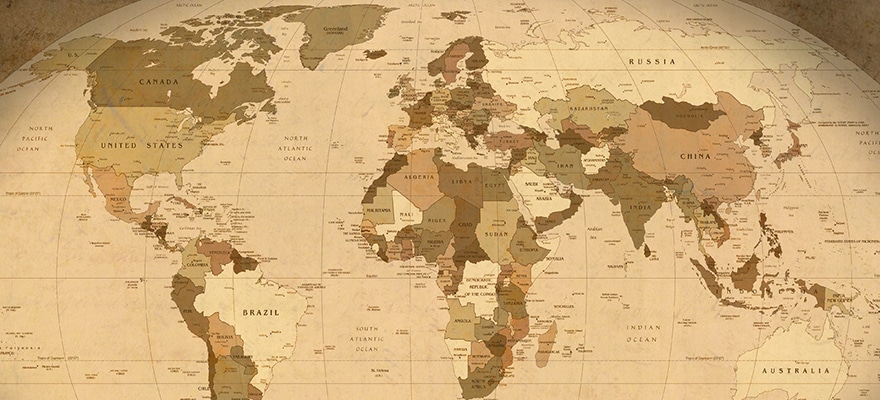This guest article was written by William Laraque who is the Managing Director of US-International Trade Services.
The game of Go consists of moving opposing black and white disks in order to outflank your opponent. One of the finest examples of outflanking on the battlefield was Hannibal at Cannae. There, the Carthaginian weakened his center and the equally balanced front of the predictable and over-exhuberant Roman cohorts charged into Hannibal's weakened center and became the victims of the world's most classic double envelopment, resulting in some 70,000 Roman losses.
Fresh from our disastrous strategic involvement and subsequent retreats from the Middle East and Afghanistan, the US has executed an 'Asian pivot'.
In commerce and e-commerce, the US Asian pivot is a political and commercial Cannae. While US corporations have spent and are spending billions to scale in the culturally-unique, entrepreneurial markets of Asia and Southeast Asia, US interests, military, commercial and geopolitical, are being outflanked by China.
Alibaba, Ant Financial and Flanking Maneuvers
Ant Financial Services Group, the financial affiliate of Alibaba Group Holding Ltd., is using partnerships to build a global network of merchants that accept its payment services. (WSJ)
Alibaba-affiliated mobile wallet Alipay signed a memorandum of understanding (MOU) with Commonwealth Bank of Australia (CBA) to enter the Australian market, according to Finextra. The partnership will make it easier for both Australians and Chinese tourists in Australia to access Alibaba services.
The partnership will enable both online and in-person shopping.
- Online: CBA will now allow Australian customers to make it easier to pay on AliExpress, one of Alibaba’s largest cross-border marketplaces. Previously, in order to shop at AliExpress, customers would have to arrange foreign Exchange . This ease of access could increase Australian shopping in these marketplaces, which could grow volume for the firm.
- In-person: Down the line, Chinese tourists will be able to pay via Alipay at selected merchants using CBA’s point-of-sale (POS) systems. Chinese tourists might be more likely to shop at a merchant that accepts Alipay, likely their preferred payment method. And that could be lucrative for those merchants, and ultimately the bank, because it gives them access to a wide addressable base — Australia sees 19,000 Chinese tourists per week that spend roughly $8,000 per person.
Alipay seems to be embarking on a rapid global expansion plan. The firm recently announced similar relationships with Payments players in both Europe and the United States.
Operating under the TrueMoney brand for payments and Ascend Nano for lending, the Thai company already operates in six countries - Thailand, Indonesia, the Philippines, Vietnam, Myanmar and Cambodia. Through its mobile wallet and agent network, the company currently provides payment services such as domestic and international remittance, bill payment, top up services, online and offline payments and payroll services.
Under the partnership with Ant Financial, the firm plans to expand into mainstream banking, with future services including lending, insurance and investment.
Punnamas Vichitkulwongsa, CEO of Ascend Group, believes the partnership will enable the firm to enjoy exponential growth: “Our goal is to provide innovative financial services to over one hundred million customers and SMEs in Thailand and Southeast Asia by 2020," he says. "Our partnership with Ant will help accelerate innovative financial services and platforms, enabling a strong financial services ecosystem.”
Ascend Money is Ant Financial’s first partner in Southeast Asia and second globally after Paytm in India. The Chinese company, which raised a whopping $4.5 billion in a series B funding round in April, has set itself a target of reaching two billion users globally by 2020. To this end, the firm is working with dozens of global payment partners, including Concardis, Ingenico, Wirecard and Zapper in Europe, First Data and Verifone in North America, Paysbuy and Counter Services in Southeast Asia, Recruit in Japan and KICC and ICB in Korea.
“Ant Financial is setting its footprint worldwide, not only to provide services for its Chinese users, but to promote equal access to financial services globally,” says Douglas Feagin, Ant Financial SVP. “Partnerships are vital for Ant Financial’s growth and we want to work alongside companies around the world who share our missions.”
Benign Neglect of Hemispherical Markets
The US e-commerce riposte of Amazon, Walmart, etc, have seen market opportunities in regions of Latin and South America go unrealized because of traditional and strategic 'benign neglect'.
The US has traditionally considered Hispanic-America to be its 'hemispheric lake', a caudillo-strewn area reserved for US geopolitical and influential hegemony fueled by a socio-political and cultural bias which largely ignores the extraordinary political and economic strides which have occurred in a geographic and culturally diverse region which the US shares with its hemispherical neighbors.
The US affinity for Asia because of its large population and the influence of historical US military and commercial success in Japan and the Philippines have distracted from the cultural synergy of more local markets. The US has traditionally considered Latin and South America to be a homogeneous region of caudillos and puppet governments with the exception of Cuba and Nicaragua, ripe for US cultural and commercial influence.
Until recently, US influence in Hispanic and Brazilian America has been largely led by military efforts. The enormous strides of the region towards democracy and non-drug related commercial pursuits have been largely ignored by a cultural bias which views all of these semi-hemispherical inhabitants as 'bad hombres' bent on propagating drug cartels and emigrating to US shores and taking jobs and opportunities from the previous occupants of 'America'.
The very term 'Americans' largely ignores the existence of Canadians, the pre-existing native Americans and the complexity of cultures and peoples who exist south of the border.
Most of the countries of South and Central America and the Caribbean are democracies and free markets striving for their versions of the American dream.
The complex reality of the US ignores that 24% of new US businesses were started in 2015, not only by Hispanic-Americans, but the majority of them by Latinas.
While off on our e-commerce assault on Asian markets, Jack Ma, like Hannibal, has enveloped our flanks. He has done this with e-commerce and mobile-banking. Like the Romans at Cannae, we consider ourselves the masters of an art and positioned ourselves in a central position on the global board, a position which is increasingly enveloped by a general who learned his craft in Seattle.






















